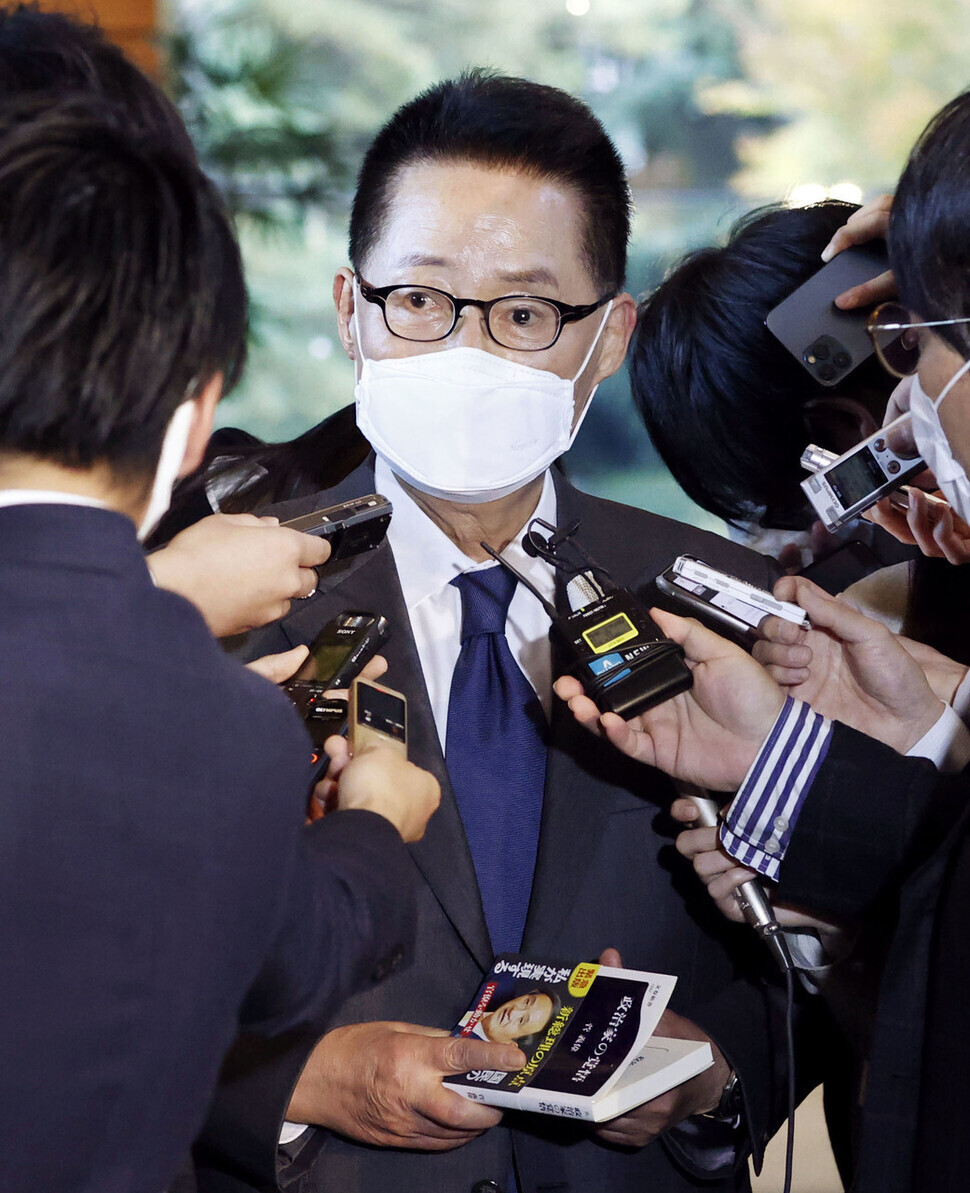hankyoreh
Links to other country sites 다른 나라 사이트 링크
NIS director meets with Suga to deliver Moon’s message for stabilizing S. Korea-Japan relations

National Intelligence Service (NIS) Director Park Jie-won discussed potential solutions to improve South Korea-Japan relations in a meeting with Japanese Prime Minister Yoshihide Suga on Nov. 10. Park was reported to have asked for a generous “political determination” from South Korean President Moon Jae-in and Suga in order to open a new chapter in the two sides’ currently soured relationship.
After arriving in Japan on Nov. 8, Park met with Suga at his official residence in Tokyo on the afternoon of Nov. 10, Japanese Chief Cabinet Secretary Katsunobu Kato said. Speaking with reporters after the meeting, Park said, “We had spoken a great deal with Japanese government officials before to coordinate things. I shared President Moon Jae-in’s earnest request for cooperation and commitment to normalizing South Korea-Japan relations with Prime Minister Suga, and heard him share many good thoughts on matters such as North Korea issues, while I too shared many things.”
Park also said that Suga had “very kindly offered many good explanations” and personally signed a copy of his recently reissued book “A Politician’s Resolve.”
Commenting on the key issue in the souring of ties between Seoul and Tokyo — namely the compensation of survivors of forced labor mobilization — Park said, “We agreed that whatever has happened, the South Korean and Japanese leaders need to resolve it, and so I’m expecting things will go well if we continue having dialogue.”
While the question of whether he had been carrying a personal letter from Moon had been attracting major interest, Park said he “did not bring one,” adding that he had delivered Moon’s message verbally. A Blue House official previously questioned by reporters about a letter said that it was “practice not to confirm such things in matters of summit diplomacy” and asked for “understanding” on the issue.
During the meeting, Suga appears to have urged the South Korean government to make a determination on the issue of liquidating assets confiscated from Japanese companies as a precondition for his participation in a trilateral summit with China, something the South Korean government is currently pushing to hold within the year. This was echoed in remarks from Kato, who responded to a question the same day about whether the Japanese government “intends to have dialogue with South Korea at a higher level” by saying, “We need to stress that liquidation must be avoided, as it will lead to a serious situation [for South Korea and Japan] if it goes ahead.”
“As in the last telephone conversation with the South Korean president, we plan to push a position strongly demanding that South Korea quickly present a solution that is acceptable to Japan,” he added.
Rather than presenting a concrete solution, Park is believed to have requested a “generous determination” from the two leaders to resolve the current severe strain on bilateral relations. Ahead of his Japan visit, he shared ambitious plans with others for restoring bilateral relations through a “Moon-Suga declaration” rivaling the 1998 partnership declaration between Kim Dae-jung and Keizo Obuchi, which opened up a historic new era for South Korea-Japan relations.
By Gil Yun-hyung and Kim So-youn, staff reporters
Please direct comments or questions to [english@hani.co.kr]

Editorial・opinion
![[Column] Welcome to the president’s pity party [Column] Welcome to the president’s pity party](https://flexible.img.hani.co.kr/flexible/normal/500/300/imgdb/original/2024/0515/3917157400447943.jpg) [Column] Welcome to the president’s pity party
[Column] Welcome to the president’s pity party![[Editorial] Korea must respond firmly to Japan’s attempt to usurp Line [Editorial] Korea must respond firmly to Japan’s attempt to usurp Line](https://flexible.img.hani.co.kr/flexible/normal/500/300/imgdb/original/2024/0514/2317156736305813.jpg) [Editorial] Korea must respond firmly to Japan’s attempt to usurp Line
[Editorial] Korea must respond firmly to Japan’s attempt to usurp Line- [Editorial] Transfers of prosecutors investigating Korea’s first lady send chilling message
- [Column] Will Seoul’s ties with Moscow really recover on their own?
- [Column] Samsung’s ‘lost decade’ and Lee Jae-yong’s mismatched chopsticks
- [Correspondent’s column] The real reason the US is worried about Chinese ‘overcapacity’
- [Editorial] Yoon’s gesture at communication only highlights his reluctance to change
- [Editorial] Perilous stakes of Trump’s rhetoric around US troop pullout from Korea
- [Guest essay] Preventing Korean Peninsula from becoming front line of new cold war
- [Column] The state is back — but is it in business?
Most viewed articles
- 1[Column] Welcome to the president’s pity party
- 2Could Korea’s Naver lose control of Line to Japan?
- 3US has always pulled troops from Korea unilaterally — is Yoon prepared for it to happen again?
- 4[Editorial] Transfers of prosecutors investigating Korea’s first lady send chilling message
- 5[Column] Will Seoul’s ties with Moscow really recover on their own?
- 6Major personnel shuffle reassigns prosecutors leading investigations into Korea’s first lady
- 7Naver’s union calls for action from government over possible Japanese buyout of Line
- 8[Correspondent’s column] The real reason the US is worried about Chinese ‘overcapacity’
- 9[Editorial] Korea must respond firmly to Japan’s attempt to usurp Line
- 10Number of foreign residents in S. Korea triples over ten years